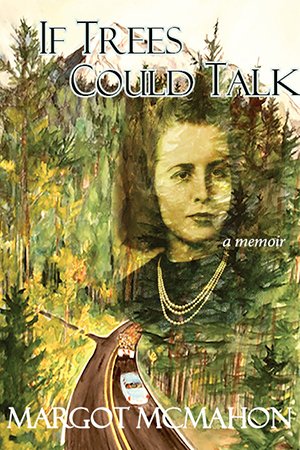Book Review: If Trees Could Talk
If Trees Could Talk. Margot McMahon, Aquarius Press, December 14, 2021, Print, 315 pages.
Review by Florence Osmund.
If Trees Could Talk is a hybrid historical fiction-memoir by Margot McMahon that blends McMahon's ancestral family history starting in the early 1800s with noteworthy events during the same time. Beautifully written and well-edited, this book memorializes the wealth of information she uncovered researching her family background to not only understand them better, but to understand more about herself as a result of her relatives' direct and indirect influences.
It is obvious that McMahon comes from a truly remarkable and talented family. Her mother, Mary Leahy McMahon, was a nationally recognized travel writer and a community advocate and teacher. McMahon's father, Franklin McMahon, was an international artist who won many awards. In addition to being an artist, he was an acclaimed reporter and filmmaker. Franklin McMahon was also a decorated WWII veteran who spent considerable time in a German POW camp. The inclusion of some of her father's illustrations throughout the book is testimony to his artistic prowess. A talented individual in her own right, author Margot McMahon's drawings and sculptures are in museums and other places all over the world. In addition, her special interests in environmental and humanitarian issues have been widely acknowledged.
As the seventh of nine children, the author's story begins with her great grandparents emigrating from Ireland to the Adirondack Mountains of New York before eventually settling in Chicago. Her commentary on Chicago's historical landmarks, sights, and scenes effectively captures the essence of the city and its people over the decades. Her vivid descriptions of holiday gatherings give readers a sense of what it was like being raised in a large family with two active, community-oriented parents. Exposed to life in foreign countries from an early age, McMahon spent substantial time in Europe and South America growing up. One of the highlights of her childhood was being in Europe with her father for a month following her eighth-grade graduation.
McMahon does an exemplary job uncovering an abundance of information about her family—their personalities, ways of life, achievements, and tribulations—in amazing detail. She recounts lengthy discussions with her father which contributed to making this book detailed with historical insight about her ancestors and their incredible journeys.
The timeline of If Trees Could Talk spans more than 150 years, and the content involves numerous persons, places, and things. Better transitions between thoughts, time periods, and scenes would have made for a more relaxed read. While people close to the family readily know who the author is talking about with just first names, other readers may have to be reminded who they are and what relationship they have with the author.
This book includes compelling stories of generations of talented people in Margot McMahon's ancestral family, several of whom dedicated their lives working for social justice and equality. Her ability to narrate these personal accounts, and extract meaning from them in such a way that other readers can relate to them, is a gift. Her introspection, reflections, and takeaways provide inspiration for all those who read If Trees Could Talk.

